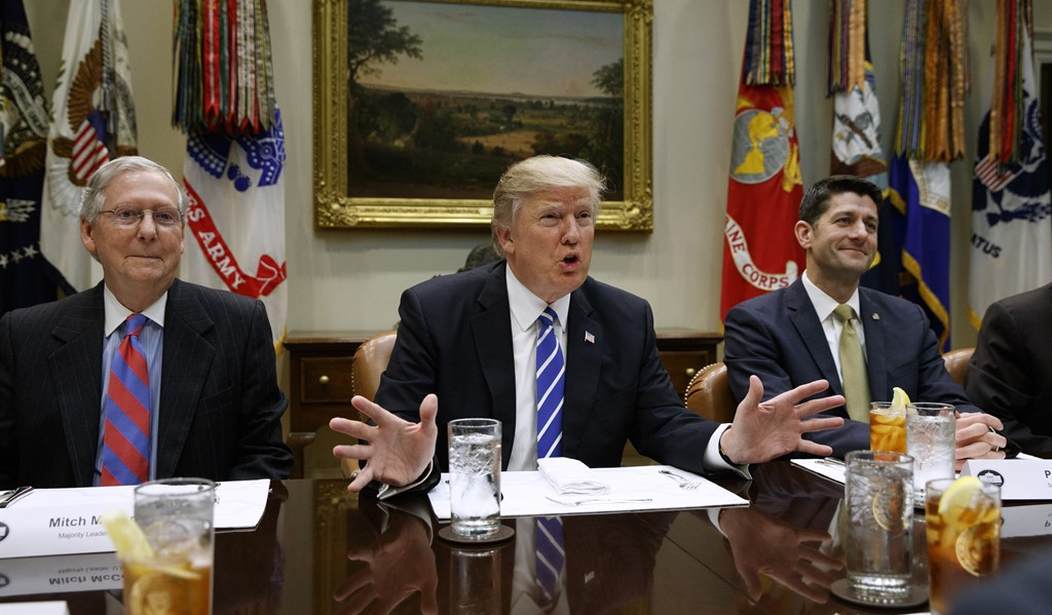So much for Donald Trump’s input, eh? Yesterday, the president tweeted out his strategy for solving the impasse in the Senate over the ObamaCare repeal effort — to split the repeal and replace functions and pass each separately. Senators Ben Sasse and Rand Paul immediately endorsed the idea, although Sasse did want to give the comprehensive strategy a few more days first.
Late last night, Mitch McConnell put the ol’ Kentucky kibosh on the proposal:
Senate Majority Leader Mitch McConnell has rejected President Donald Trump’s advice to first repeal President Barack Obama’s health care law and then replace it later with something else.
McConnell says the current health care bill remains challenging but “we are going to stick with that path.”
After Trump’s morning tweet demanding an immediate clean repeal, the White House tried walking it back — at least a little bit. Fox’s John Roberts asked whether Trump had changed his thinking on the strategy for health care, and Sarah Huckabee Sanders insisted he hadn’t:
Q Sarah, the President tweeted this morning about healthcare.
MS. SANDERS: He did.
Q In which he said that if the senators can’t get a bill on repeal and replace together, then maybe the best idea would be — as Ben Sasse and Rand Paul have suggested — split them up into a repeal and then a replacement later. This really runs counter to what the President has been promoting all through the campaign and earlier this year where he insisted that the two things had to be done, if not simultaneously, at least very close to each other. What is the basis for his change in thinking on this particular point?
MS. SANDERS: The President hasn’t changed his thinking at all. I mean, he’s campaigned on, talked about since he was elected repealing and replacing Obamacare. We’re still fully committed to pushing through with the Senate at this point. But we’re looking at every possible option of repealing and replacing Obamacare. We are focused on doing that.
As I said earlier, there is another large amount of counties that now have no Obamacare provider, and so we’re continuing to work hard to repeal and replace Obamacare, and that hasn’t changed.
Q So how does it square this idea with repeal it now, replace it later with what you had said on repeated occasions before that these things needed to be done very close to each other in order to maintain continuity of coverage for many Americans?
MS. SANDERS: Again, we’re still focused on trying to push through where are, and we’re going to continue moving forward and making progress on that front and looking at repealing and replacing Obamacare. The bottom line is, we’re focused on the end product here, and that is to repeal and replace Obamacare with healthcare that works for all Americans.
McConnell won’t bite on it for a number of very good reasons. One: He won’t get past 52 votes for any form of repeal or replacement because there are no Democrats who will join the GOP on either at the moment, so it has to fit under reconciliation or it won’t happen at all. The Senate has one vehicle for reconciliation in place, and while they could craft another, it will create even more potential roadblocks. If they repeal it and then couldn’t get a replacement bill passed, the resulting chaos in the markets would have voters up in arms in next year’s midterms.
Two: McConnell doesn’t have 50 votes for a straight repeal. The moderates are balking at the plans under consideration because they don’t do enough to cushion Americans in individual markets for a transition, so there’s no way they’ll go for a sink-or-swim vote. They want to defend their vote by showing that they passed something in the same vote that performs better than ObamaCare. Rand Paul, Ted Cruz, Ben Sasse, and Mike Lee would all jump at the chance to vote for a straight repeal, but Susan Collins, Lisa Murkowski, and especially Dean Heller would balk, and McConnell would likely lose at least three or four more Republicans to boot.
Three: Despite Trump’s tweet yesterday morning, there appears to have been significant progress over the last couple of days. Ted Cruz’ compromise plan seems to have engaged all sides in the Senate Republican caucus, and any enthusiasm for that has to be heightened by a sense of having their backs up against the wall. That, plus McConnell’s Monty Hall machinations, may be just enough to pull this effort across the finish line in the next few days. The only way to ensure that is to keep repeal and replacement linked, even if that means having a bill no one really cheers, and hoping that Tom Price at HHS can plug the gaps for a while on the regulatory side.
Needless to say, McConnell will be busy this weekend on the phones. That would explain his lament last night to his fellow Kentuckians in Elizabethtown last night: “It’s not easy making America great again, is it?”
Update: McConnell’s quote should have been “… making America great again,” not American. The AP had the quote incorrect, but later corrected it. I’ve corrected it above and in the subhed.








Join the conversation as a VIP Member